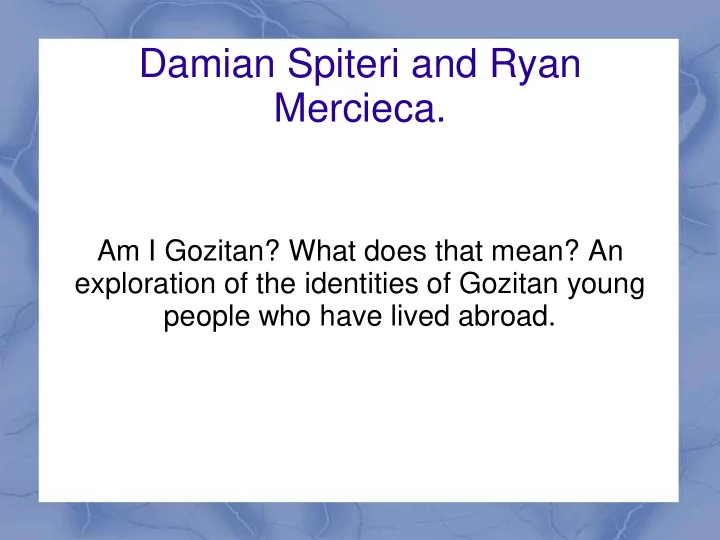

Damian Spiteri and Ryan Mercieca. Am I Gozitan? What does that mean? An exploration of the identities of Gozitan young people who have lived abroad.
Rationale of study. The study will focus on the perspectives of Gozitan young people who have a dual citizenship. They have lived both in Malta and in the US. It will analyze how they negotiate their identity as Gozitans, particularly since, as EU citizens, they can live and work in different parts of the EU.
Different categories of people who have lived abroad. Those who have lived abroad and only come to Malta sparsely; Those who live abroad and come to Malta every so often, Those who have lived abroad for some time, returned to Malta, and see themselves as Maltese.
Focus of study. The analysis we are presenting is focused on the third category, who, when outside of Malta and asked where they come from, usually they refer to themselves as Maltese rather than Gozitan. They are ten young men who had lived for some time in the USA. Other than this, they see themselves more as Gozitans than as Maltese.
Gozo lace making.
Gozo – an open or a closed space? “In today's day and age, if one is to go into facebook, it is as if one has gone to the village square and met up with friends so as to socialise and have a drink [ illum il- ġurnata, tidħol fil- facebook, qisek tmur il-pjazza, tieħu drink )” . Does this make Gozo open? If we think of Gozo as a closed space, we can ask is there such a thing as a Gozitan identity.
Are we Gozitan?
Routes and roots. Some of the participants went and came back without revisiting Gozo when they were gone. Others revisited from time to time, hence we are talking of family roots within the broad overall context of the routes that they were taking. Some, particularly those who went abroad for relatively shorter periods, went with a clear intent of returning to Gozo.
Routes and roots. Another of the participants, who had lived in the US, described having been told of his parents' desire to return to Gozo as something that came completely out of the blue, it was a complete shock to him ( niftakar li kien xokk kbir għalija, meta kienu qaluli li ser immorru noqgħodu Għawdex għal dejjem ).
Xlendi during a storm.
The Gozitan notions of Gozo. To the Gozitans, the Gozo boat is not simply a means of travel, as it is to many Maltese, but rather, it is a space in which people can meet up and also get lifts from others. To young people of school age who have returned from the US, and have started attending school in Gozo, they eventually lose their American English accent. In the process they see themselves as becoming more Gozitan.
The Gozitan notions of Gozo. One of the participants said that even though he had lived in the USA for around three years, to him, today, it was as if he never left (qisni qatt ma tlaqt). On exploring with him why this was so, he explained, that even in New York, in his case, in Manhattan, when at home, he spoke in Maltese, and thereby, he never stopped identifying with the island. He always believed that, someday, he would return here.
The Gozo ferry.
The safety valve notion. There appears to be consensus among the participants that the US serves as a form of safety valve, if ever they feel unhappy in Gozo, Malta or Europe, and want to leave, they can. This is in virtue of their all having a dual citizenship
The end.
Recommend
More recommend